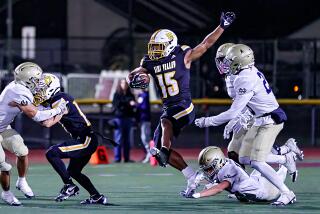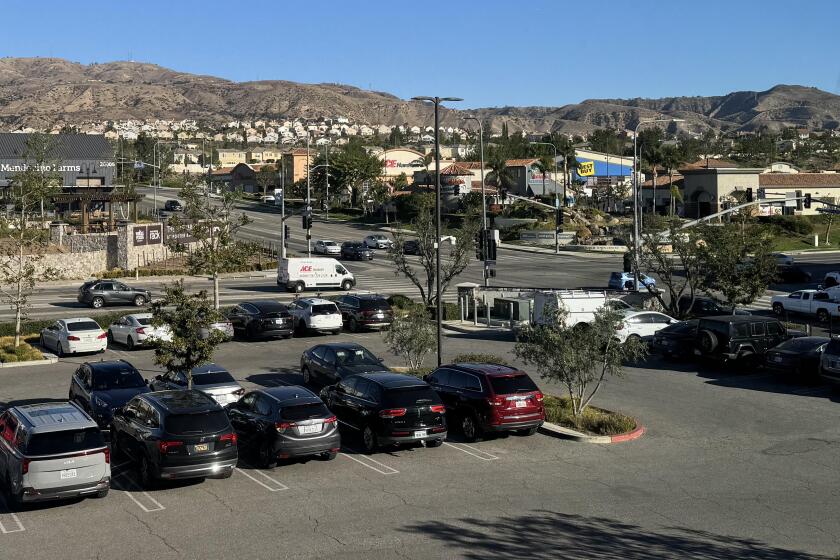Fielding a Dream : The City Will Host the Burbs in 2nd Softball Event for Better Race Relations
- Share via
Debbie Siler of Compton doesn’t fear getting lost in Simi Valley anymore.
“Last week I was driving toward Simi Valley with a friend and I told her, ‘Don’t worry. If we get lost, I know a police officer out here,’ ” Siler said.
Siler met the police officer, Detective Gene Hostetler, last year at a softball game between South Los Angeles area and Simi Valley residents as a way to unite the two communities.
The game was congenial and successful, and a second will be played Saturday at 12:30 p.m. at Jesse Owens Park at 9651 S. Western Ave. in South-Central. But since the first game, residents from both communities say that they have struggled to maintain their optimism about race relations in Los Angeles and acknowledge that little has changed.
“I haven’t really kept in touch with anybody from Simi Valley, but I would feel comfortable enough that if I saw someone from the team it would be nice and I’d stop to talk to them,” Siler said.
Although members of both squads said overall perceptions of their respective communities had not changed much since they met last year, Siler was quick to say that some of the goals of the first game at Rancho Santa Susana Park in Simi Valley have been achieved.
“I’ve learned to take people with a more open mind now,” said Siler, 37, a nurse. She recalled her reluctance upon first learning that several of the Simi Valley players were police officers, including Hostetler, a detective with the Simi Valley Police Department.
“When I first saw him I thought, ‘He’s a creep,’ but he turned out to be a sweetie. Now we have a rivalry going because we’re both pitchers,” Siler said.
The teams have met on two other social occasions since the first game, including a Super Bowl gathering, but members of the two communities have, for the most part, maintained separate lives and continue to face different problems.
“Some (suburban residents) may still be afraid because they think South-Central is all gangbangers, but I live on the same street where I grew up and my neighbors are great,” said Jan Hardy, one of the organizers of the first game.
Hardy, who recently lost her job as a loading-dock worker, said she is trying to balance the ideas that prompted her and Simi Valley resident Susan Davenport, then a co-worker at an Inglewood computer company, to organize the game with the changes in her life and community.
“I’ve been thinking lately about what happened last year--the riots--and I ask myself, ‘Where are all the programs that were meant to help?’ ” Hardy, 39, said. “But I try and stick with it. My thing is unity. With all the things that have happened, something has to be done.”
Davenport, who now works in Simi Valley as a comptroller at a computer company, said the goal of the game remains to bring residents from the suburbs and inner city together. Last year’s game drew several hundred spectators who watched the South-Central team defeat the home team.
While Hardy and Davenport have become close friends and have enjoyed watching their teen-age daughters develop a friendship, both women express frustration at how little things have changed off the baseball diamond.
“I feel the frustration a lot when I think of Brandi (Hardy’s 13-year-daughter),” Davenport said. “It frustrates me that Brandi can’t go out and play in the park because she might get shot. It irritates me because I wish there was more I could do.”
For her part, Hardy said she remains optimistic because “things have to change--even if they get worse, they have to change.”
For Siler and other members of the South-Central team, the game has helped dispel misconceptions, but has not eased a sense of frustration.
“I feel as if we all had big ideas about what should be done,” Siler said. “But it takes more than just saying it. It goes deeper then that, and that almost makes me pessimistic.”
Although friendship and understanding are what most players said they have gained, both groups acknowledged the game’s effect off the field is limited.
“After the riots last year, my daughter, husband and I went to South-Central to help with the clean-up efforts, and that was simply putting a Band-Aid on the problem,” Davenport said. “This (game) may seem trivial but it gives people a chance to see we all have the same goals.”
Saturday’s game will feature a color guard, music and a chance to show Simi Valley residents that South-Central is more than just a place for gangs, Hardy said.
Hostetler agreed, adding that the fear some suburbanites may have is misplaced.
“The only difference between us and the inner city is we don’t have the economic problems they do,” Hostetler said. “We’re just trying to communicate that Simi Valley residents and Los Angeles residents are no different. We all have the same ideas about life, about wanting to raise our kids the best we can in a safe environment and have fun.”
The players hope the game will be another step in healing the wounds of two communities deeply affected by last year’s civil unrest, but they have yet to discuss the city’s problems off the field.
“We’ve never really talked about the verdicts (in the first Rodney G. King beating trial),” Hostetler said. “We mostly joke at the games. I don’t know if I really want to talk about it. Everybody has their own opinion, but maybe someday a bunch of us will sit down and hash it all out.”
More to Read
Get our high school sports newsletter
Prep Rally is devoted to the SoCal high school sports experience, bringing you scores, stories and a behind-the-scenes look at what makes prep sports so popular.
You may occasionally receive promotional content from the Los Angeles Times.






